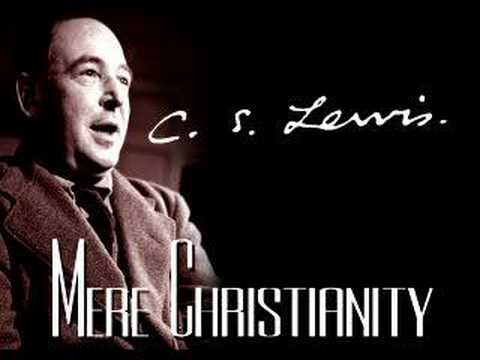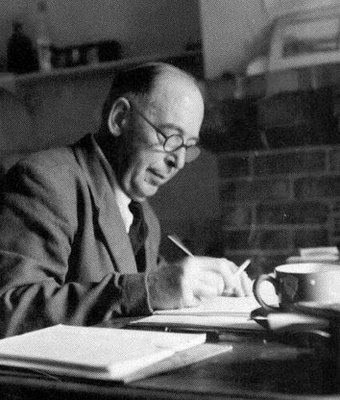I’m teaching my C. S. Lewis course at my university again this semester. The students began their Lewis reading with Surprised by Joy, his insightful autobiography. We are now focused on Mere Christianity and discussing the significance of that book. Every time I come back to it, I’m deeply impressed all over again, and I always seem to find nuggets of truth and wisdom that stand out more clearly than in my previous reading.

This time I was struck particularly by comments in the chapter, “We Have Cause to Be Uneasy.” Lewis begins by putting himself into the minds of some of his readers who might be starting to realize that he has been moving them toward consideration of Christianity as the solution to the problem of right and wrong and their problems with obeying the moral law that they sense within themselves.
You may have felt you were ready to listen to me as long as you thought I had anything new to say; but if it turns out to be only religion, well, the world has tried that and you cannot put the clock back.
That objection is one used commonly by those who believe that anything from a former time cannot possibly be of any use to us in our new and enlightened age. Historians have to deal with this all the time. I recall one course I took in my doctoral program in which one of the books simply assumed that the people of colonial America obviously had little to offer us today—we are just so much more intelligent and well-informed than they were. At least, that was the tenor of the book. Lewis will have none of that:
First, as to putting the clock back. Would you think I was joking if I said that you can put a clock back, and that if the clock is wrong it is often a very sensible thing to do? But I would rather get away from that whole idea of clocks.
We all want progress. But progress means getting nearer to the place where you want to be. And if you have taken a wrong turning, then to go forward does not get you any nearer. If you are on the wrong road, progress means doing an about-turn and walking back to the right road; and in that case the man who turns back soonest is the most progressive man. . . .
There is nothing progressive about being pigheaded and refusing to admit a mistake.
That word—progressive—is always co-opted by people in politics who demean those who hold to traditional views about the proper role of government in our lives, i.e., limited. They always want to make government more intrusive, and if you disagree with them, you are a relic of the past. But modern progressivism may not be all that progressive at all; it may be a big mistake. Yet admitting that is difficult for those who want to be seen as forward-thinking and not bound by the past. That past, though, might have contained more wisdom than the newest of “progressive” thought.

Lewis then addresses man’s perceptions of God. He is good, right? Well, yes, Lewis says, but maybe our concept of good is not wholly accurate. “The Moral Law does not give us any grounds for thinking that God is ‘good’ in the sense of being indulgent, or soft, or sympathetic,” Lewis cautions. “There is nothing indulgent about the Moral Law. It is as hard as nails. It tells you to do the straight thing and it does not seem to care how painful, or dangerous, or difficult it is to do. If God is like the Moral Law, then He is not soft.”
Lewis is writing (and was speaking, since the book is a distillation of his BBC broadcasts during WWII) to an audience that he felt had lost the sense of guilt for sin and the remedy: repentance and forgiveness. Everything he has written in the book up to this point, he acknowledges, “simply does not make sense until you have faced the sort of facts I have been describing.” He continues,
Christianity tells people to repent and promises them forgiveness. It therefore has nothing (as far as I know) to say to people who do not know they have done anything to repent of and who do not feel that they need any forgiveness.
It is after you have realised that there is a real Moral Law, and a Power behind the Law, and that you have broken that law and put yourself wrong with that Power—it is after all this, and not a moment sooner, that Christianity begins to talk.
When you know you are sick, you will listen to the doctor. When you have realised that our position is nearly desperate you will begin to understand what the Christians are talking about.
People don’t like a hard message about sin and repentance. Lewis understood that. If he were here today and witnessing what our society is like now, I think he would be even more concerned than he was during his era. We want words of comfort, not words that tell us of our obligations. We seek self-esteem when we should instead be desiring self-control. We want to be delighted with promises that life is a playground where all our wishes come true. We’re not too keen on being told that life is filled with hard decisions, discipline, and difficult circumstances.

“I quite agree,” Lewis concludes, that the Christian religion is, in the long run, a thing of unspeakable comfort.” Yet comfort is not where it starts. After all, there is that sin problem that must be taken care of. “But it does not begin in comfort; it begins in the dismay I have been describing, and it is no use at all trying to go on to that comfort without first going through that dismay.” Forgiveness comes only after we first recognize our sinfulness and come to the Cross with a heart of repentance. Lewis ends the chapter with these words:
In religion, as in war and everything else, comfort is the one thing you cannot get by looking for it. If you look for truth, you may find comfort in the end: if you look for comfort you will not get either comfort or truth—only soft soap and wishful thinking to begin with and, in the end, despair. Most of us have got over the pre-war wishful thinking about international politics. It is time we did the same about religion.
When I wrote my book, America Discovers C. S. Lewis, I conducted a survey of Americans who say that Lewis was a major factor in their Christian faith. When I asked which of Lewis’s books was most influential for their faith, Mere Christianity came out on top. This chapter is a prime example for why that is.
